Life goes on in Wendover, the town that straddles the Utah/Nevada border out here on the Bonneville Salt Flats. Tonya and I finished what we had to do this morning in Blanding, Utah. We dropped off the sum total of a man’s writing and photos, as well as the photographic output he had collected from two other people over the years. Between the three of them, they had driven all over the west for decades, snapping photos and taking notes. We were happy to get it out of our hands, though, having spent a week on the latest phase of this project. We then drove in convoy, Tonya in the 4Runner and me in a massive rental Chevy Suburban, up from one corner of Utah to the opposite one. It was over 95 degrees most of the time and hit 102 degrees Fahrenheit for the last few hours, as we drove straight up from the south. We sped through Salt Lake City and finally dropped that beast Suburban at the rental car return in the Salt Lake City airport.
We then happily reunited in the same car, where she and dog Santo had been having a party and playing music for the past three days. I eased the Toyota onto I-80 for the 116-mile drive to the salt flats. I had wanted to get to the town of Wells, Nevada in order to set up the next two days, but there were no rooms at the only two decent motels there. It’s not a town I ever want to stay in, anyway. Wells is a broken town. The last earthquake may have been the final straw. So we settled for Wendover, which is on the Utah side of the border, but you can cross a street and be in West Wendover, Nevada.
I drove the 4Runner at a slow and stately 60 miles-per-hour on the 80 mile-per-hour highway to save the motor during the heat, which had fallen to 99 degrees. As I drove, Tonya worked the phones and made motel reservations for the next few days. I never liked to travel that way in the past, preferring to wander from place to place and figure it out when I got there, but I have come to appreciate making plans, at least once in a while. I might have been better served by making more plans earlier in life, rather than wandering, but it’s too late to dwell on that. And maybe I needed to wander.
It was great to be in the same car again - me, Tonya and the micro hound, Santo, who slept in the back, oblivious to the crushing, dangerous heat. “It’s a dry heat,” as they say out west, but it’ll kill you just the same. So I kept it at 60 and let the few other travelers pass me by. We had a rump cell signal and happily figured out the next few days, when we could finally have a vacation after months of settling this estate. On this trip, “vacation” means grinding out hundreds of miles a day, but we’re all together and doing interesting stuff, like meeting my hot springs buddy Paul up north for a day on the Black Rock Desert playa, finally getting to the coast for a few days, meeting up with Tonya’s mom, then taking the northern route back and - hopefully - enjoying weather that won’t kill you.
We went to a gas station and filled up, washed the windshield, then sorted out the dog’s food in the cooler. I wanted some ice, but didn’t like the thin plastic, overstuffed bags they sold in the Shell station, so I went by the Philips 66 station a block away. The guy inside was a sad sight. Nobody was buying his gas. They were all going to the shiny, new Shell station and he just sat there behind the register, thinking too much about life and wondering what was going to happen. I asked if they had 5-pound bags of ice and he just barked “Ten!” I said, “Okay, I only need 5.” He tried to persuade me, even though there was no feeling and no warmth to his face, by saying “It’s hot out.” I explained that I didn’t have that much room in the cooler and he said, “Fifty cents a cup,” meaning I could buy large soda cups of ice for fifty cents each. I decided this was not something I wanted to haggle over and cut a fast retreat. I drove back to the Shell station, where the ice bags looked a lot better to me than they had 10 minutes earlier. I ripped one open, emptied the ice into the cooler and then we made a left turn, towards what the signs call the “Historic Air Field.”
It’s where they trained bomber crews during World War II, B-17s and B-24s. Colonel Paul Tibbetts drilled his B-29 crews here for the atomic bombing of Hiroshima. The government put them as far from civilization as possible for that.
There’s a small Mexican restaurant at the edge of the base called the Salt Flats Cafe. It used to be a few miles east of town, on the Bonneville flats, but they had to move to this small building at the old airfield. There were many cars and I was worried it would be packed. Tonya urged me to go in, saying, “Maybe everybody showed up alone in their own car.” She was basically right. There was one long table with a family, a noisy, happy dysfunctional family enjoying a tremendous meal together, then a few tables of other people eating. Everybody was local. We had been here before and enjoyed the food, and we decided to sit down. Santo napped in his bag next to us in the booth and we ate like feral javelinas. The food was good and we staggered out into the heat. We drove into the old base for a quick loop, even though we were exhausted.
We passed the old buildings. The sun hit them at a perfect angle, at the end of its daily arc, even though it’s one of the longest days of the year. Block after block of abandoned barracks and work buildings, preserved through neglect, slowly crumbling into the ground. The military walked away from this base and the buildings are empty and glorious. If you squint, you can imagine what it was like. If you’ve read enough books, at least, and maybe watched enough of those war movies I watched obsessively as a kid. We were hoping it wasn’t a dead end when the map told us to make a left, which we did. It was a bit of a shock to come upon a few hundred people in full camouflage BDUs, standing at silent attention in the 100-degree heat, saluting the American flag as it was being lowered. I thought they had to be full military, but there was a sign that we passed saying something about the Civil Air Guard, so I’m not sure. I do know that it was oppressively hot and the sight of them all standing still in a group, heavily dressed and saluting, was impressive. Impressive for the act and for the silence, as well as the heat, the furnace heat.
We got to the hotel just a few minutes later, found a place to park, got all the bags up the stairs. We were exhausted, but had to feed the little dude. I grabbed a small baggie of food from the cooler and we went into the heat. He was not interested in eating in the room. After dodging other guests with dogs, some well-behaved and some not, as well as a few feral cats who were barely surviving the heat, we sat on a quiet bit of curb at the end of the lot and began to feed Santo.
A guy in a large Subaru slowly drove in from the road. As he rolled past us, he looked grim and focused, with a bright red face. He parked and just sat there a while. Then he opened the rear hatch and we saw a large dog cage that filled up the rear of the car. Inside was an adult German Shepherd. I tensed up because Shepherds all seem to want to destroy Santo, even though he’s 12 or 13 pounds. Or maybe because he’s 12 or 13 pounds. So we watched and I went through the plan in my head of what to do if the guy released the dog off leash. I pick up Santo and toss him into the back of the pickup next to us. Of course, the Shepherd could probably leap into it easily, but my plan ended there. And that’s how I waste my life, by worrying about shit like that. Is there a difference between worrying and planning? Probably.
We didn’t have to worry. The guy got out and we made contact with him. I might have said “hi.” He didn’t seem to want to engage, but he did. His responses were all, as Tonya noticed, canned sayings that he tossed out automatically, like tape loops. He may have never learned to interact with people in any other way, but we had some overlap with the dogs and we each ran with it. He joked, “I was hoping for a Chihuahua” as his 100-pound beast stood there on a leash. I made my bad joke about how Shepherds always want to kill my dog, which is true, and he said, “This one won’t do that” and I believed him. This was a well-trained dog. He said it was his third shepherd, his “retirement dog,” and he used the word “deployment” a few times to hint that he was ex military. I often doubt it when guys try to hint at their military past, especially if they stress the combat part. The vets I knew in life who had seen the worst stuff usually spoke of it the least. Anyway, I gave him the benefit of the doubt. He had the air of one of those film noir vets who are just on the edge of holding it together. He was maybe 60, but he had that air. Maybe not an officer, but a retired Master Sergeant kind of vibe.
The canned answers continued in response to whatever we said. I don’t remember the prompt, but he said “I prefer being cynical. Then, when something good happens, I’m pleasantly surprised.” His bright red face could have been from the sun. It could have been from a life of hard drinking. Or maybe it was a medical condition. He didn’t seem to want to talk, but he did, almost out of obligation. Or maybe we were the first people he had spoken with all day. We were talking about dogs, after all, and he told us his was a year old. He told us its name, along with the names of his two previous ones, in response to my question, and he talked a bit about their history. His dog was a truly beautiful hound with a huge black head and was incredibly well-behaved. I said, “We don’t deserve dogs,” something I have been repeating too much the last few years, my own canned phrase. He asked me to repeat what I had said. It was not something he had heard before and I guess it was a prompt that needed another turn in his head. I repeated it and added “They’re too good for us.”
He understood and spat out, “I’ve been out-manned, out-numbered and out-planned, but never out of luck when I have a shepherd.” I didn’t know until later that those are song lyrics but, at the time, it made me wonder if he was doing the fake military thing again. I decided to ignore his words and just judge the facts. He was lean and took care of himself. He stood up straight. He wore a green army shirt with no insignia and he kept a tidy car. He might have been what he was hinting at. I’ll never know, although I planned to look at his license plates if his car was still there in the morning. It made me wonder where he was heading, him and that dog in the big carrier in the rear hatch of his car.
All of these people we see on the road - the ones heading in every direction, the ones who stay in place and serve the travelers. The ones who pass by in the background. They are what life is as much as the empty forest or the bottom of the ocean. When we went out for the late dog walk, the heat had died down and a strong wind was blowing hard off the salt flats, a strong, dry, deadly, magical desert wind. It’s something I think about at home when I think of the west. It’s alive, that wind, and it carries voices on it, although I have to stop my brain so that I can hear them. Some of the voices on that wind are now mine. There are other winds that speak - on a coolish night in New York City, especially by the river, the wind can talk. There are winds in the Greek islands that have names. They carry all thought and feeling on their gusts.
We have some long days ahead of us, driving across Nevada and California. It’s going to stay close to 100 degrees until we hit the coast, the misty, cool and magical coast. I often want to flee home, to be in my own bed, doing my little home chores, but it would not be half as good without the hard days on the road, those hard days that are like special gifts, wrapped up and hidden in the crook of a tree up a long trail.
All photos by Paul Vlachos.
If you enjoyed this post, hit the ♡ to let us know.
If it gave you any thoughts, please leave a comment.
If you think others would enjoy it, hit re-stack or share:
If you’d like to read more:
And if you’d like to help create more Juke, upgrade to a paid subscription (same button above). Otherwise, you can always help with a one-time donation via Paypal or Venmo.

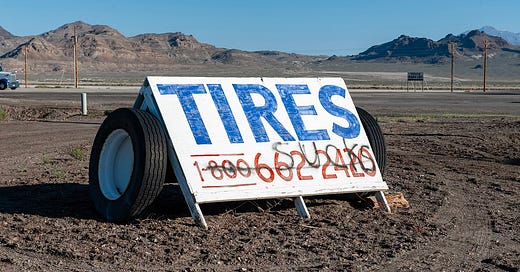


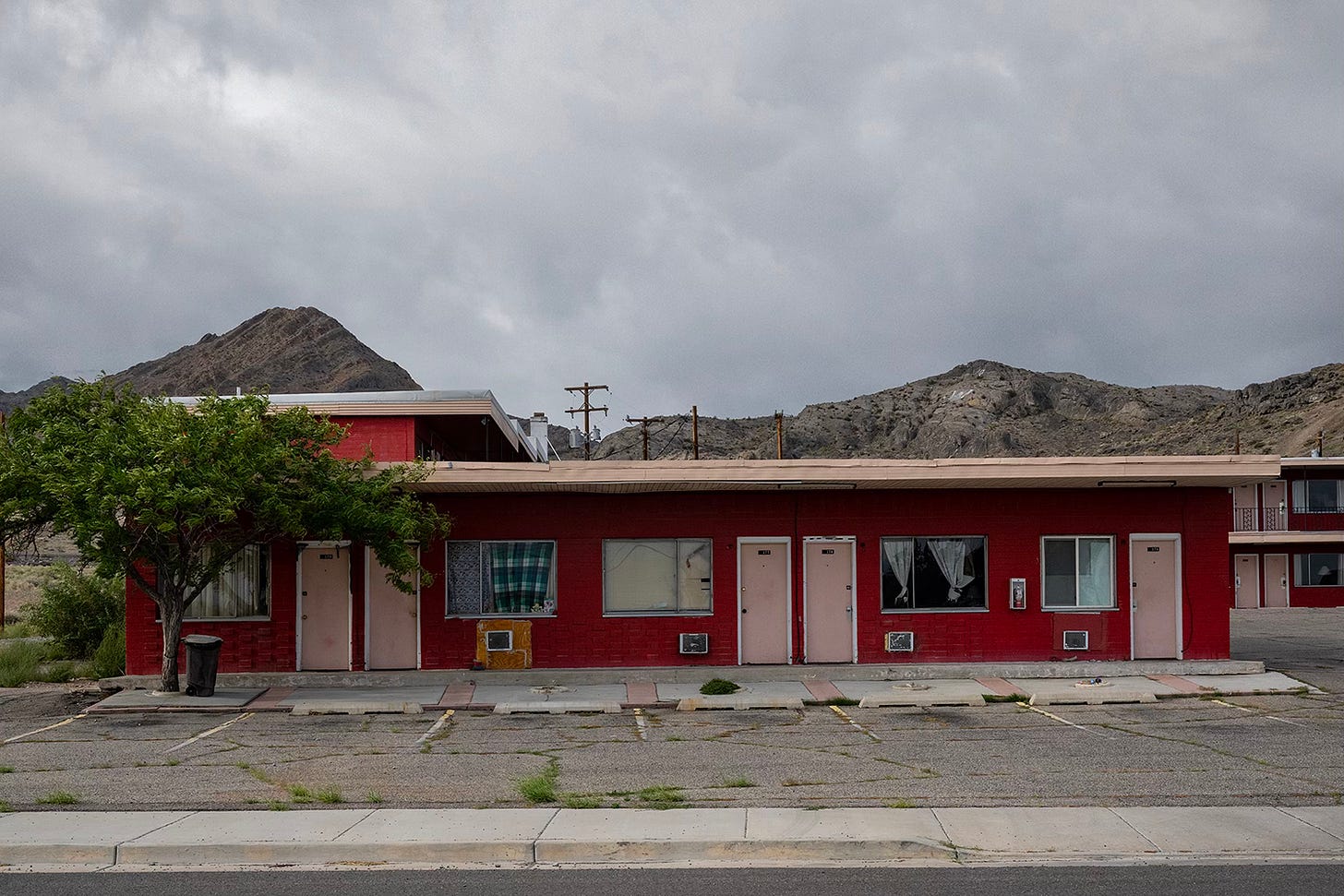
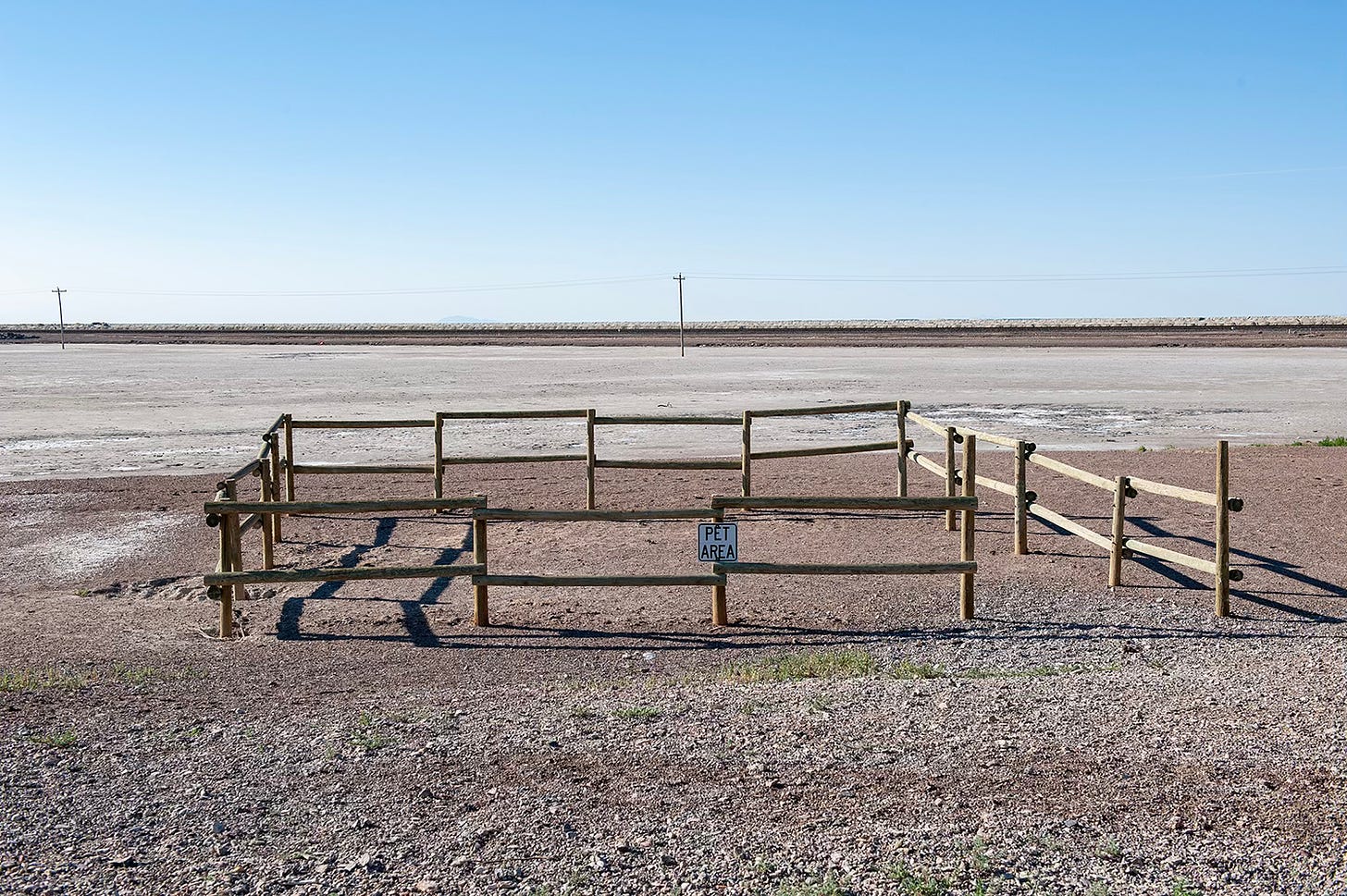
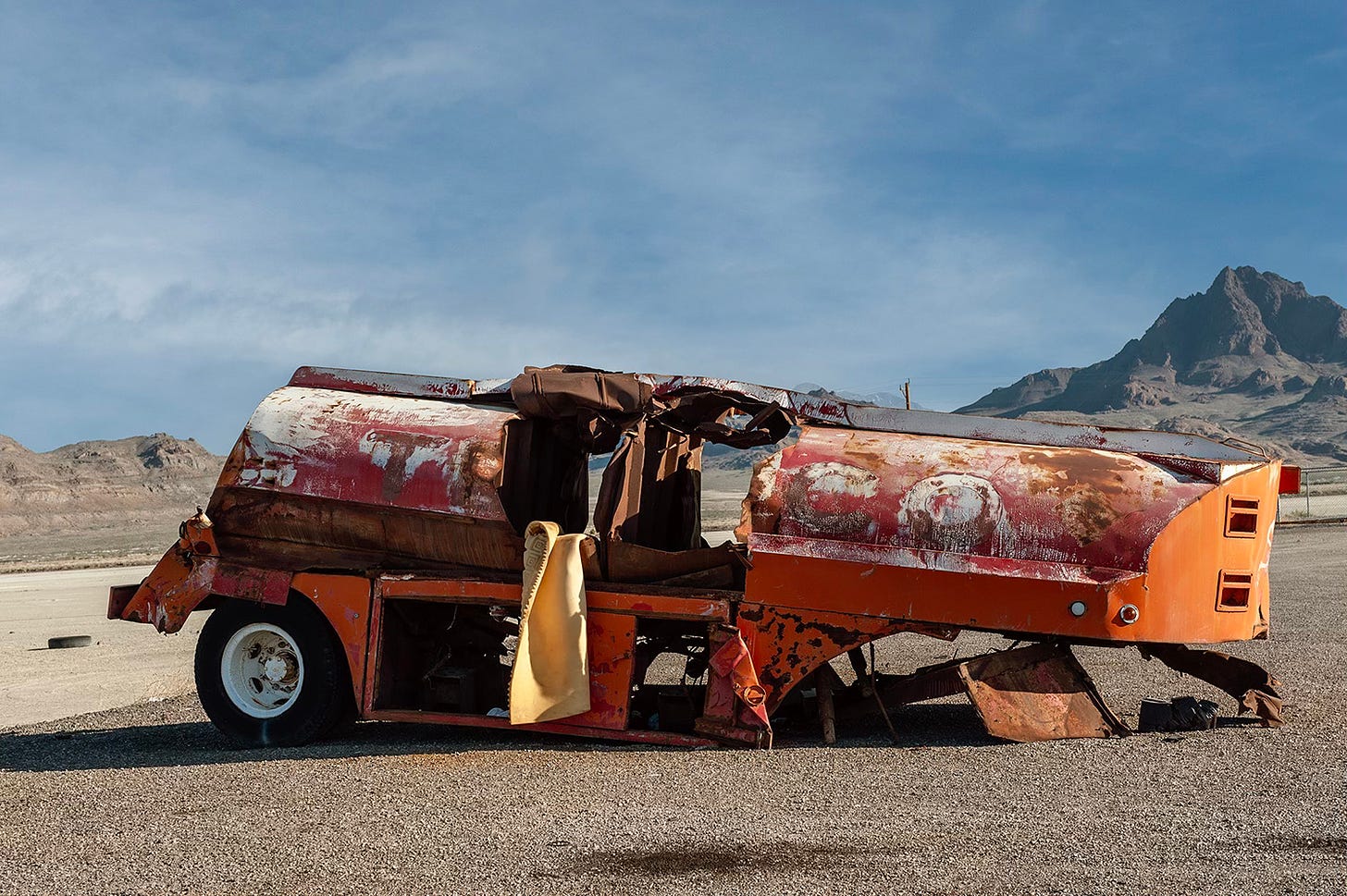
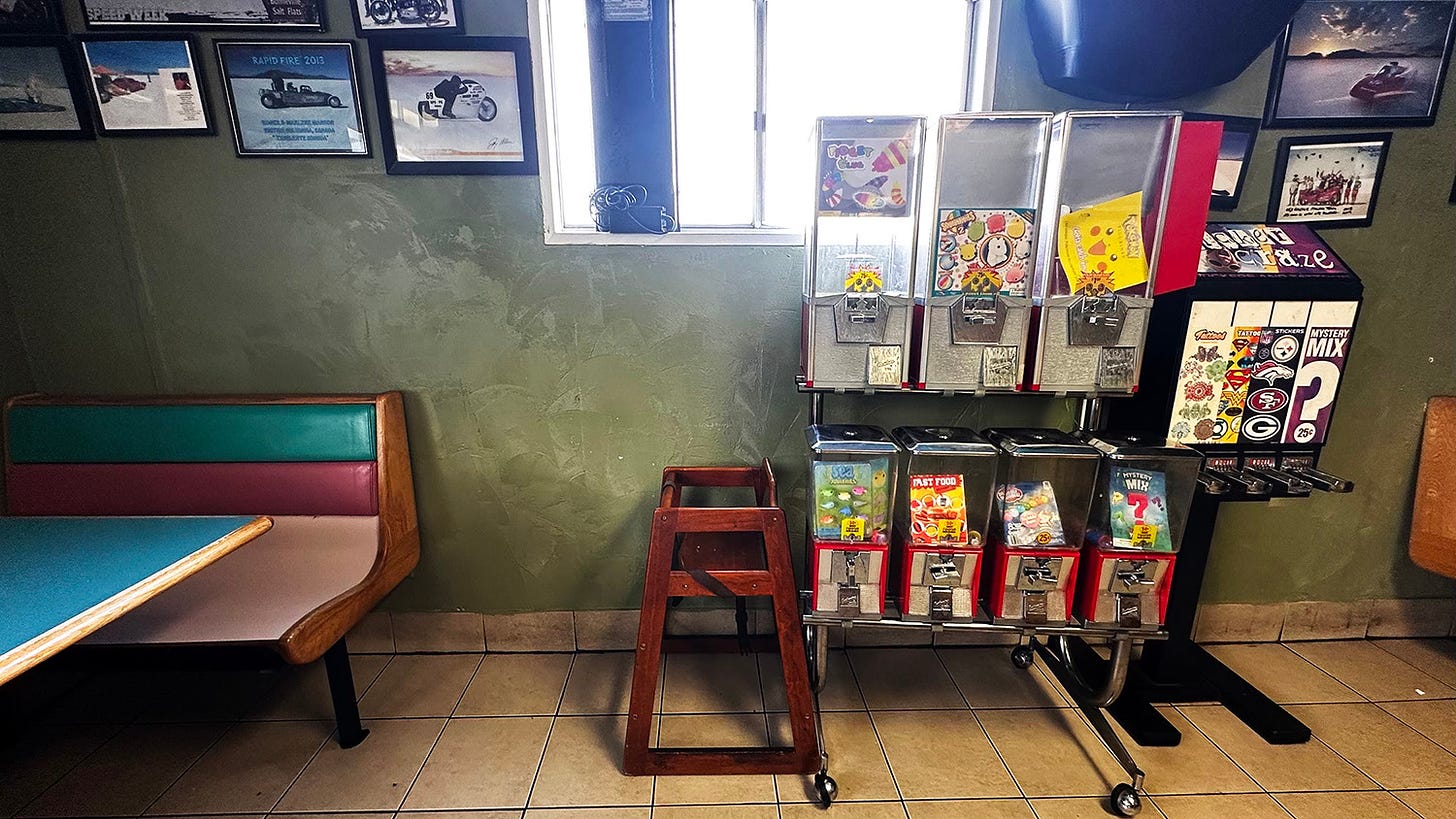
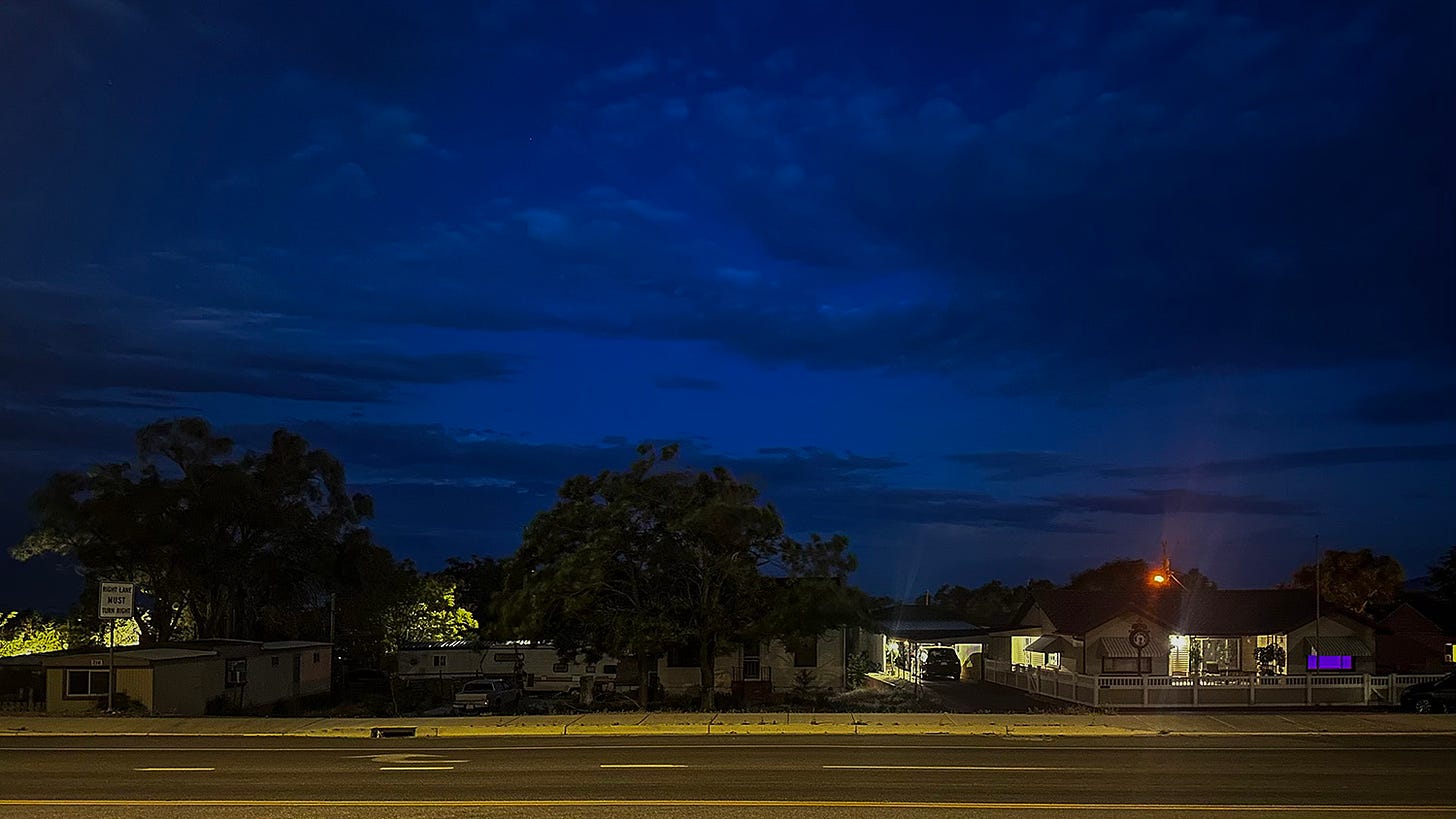

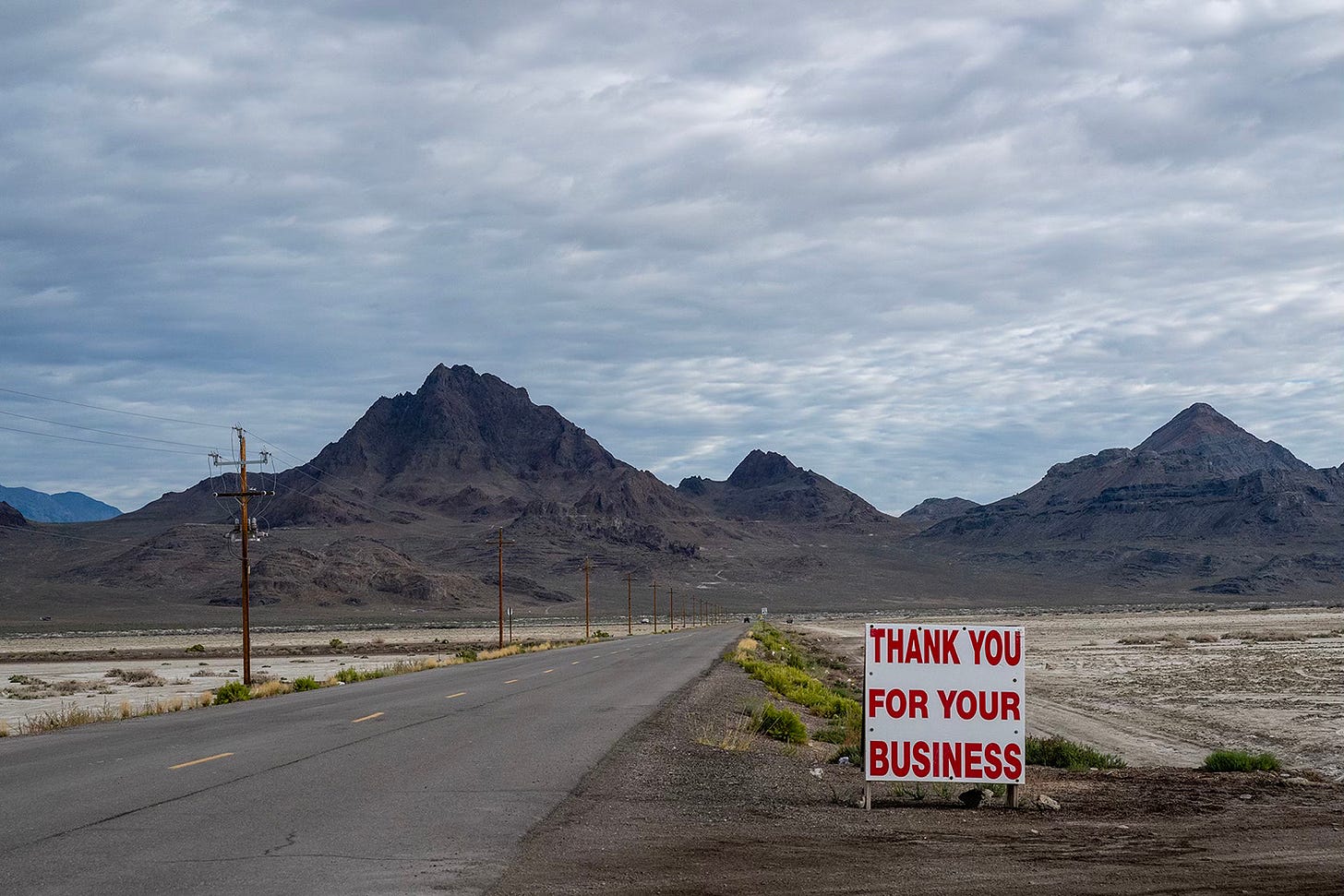
I loved that final line; "like special gifts, wrapped up and hidden in the crook of a tree up a long trail." That's exactly what a road trip feels like. We dosing against the monotonous scenery, and then a surprise: an old barn with a story, a line of clothes on the line, maybe, in the Great Basin, a herd of wild horses on one side and a herd a antelope on the other, both grazing in belly-deep grass.
Thank you, Paul and Tonya, for this visit to Wendover. A strange town indeed. Spangled casinos rising from the desert floor - so out of place among the shabby motels and bedraggled stores or cafes. Then there's a suburban wannabe on the west end with neat houses and gardens, tiny squares of grass. On the east side is the community center with a large auditorium and a tiny restroom without a diaper changing table. How in hell does that happen in a place with so many Mormons?
"we ate like feral javelinas" - maybe one of the best sentences EVER!